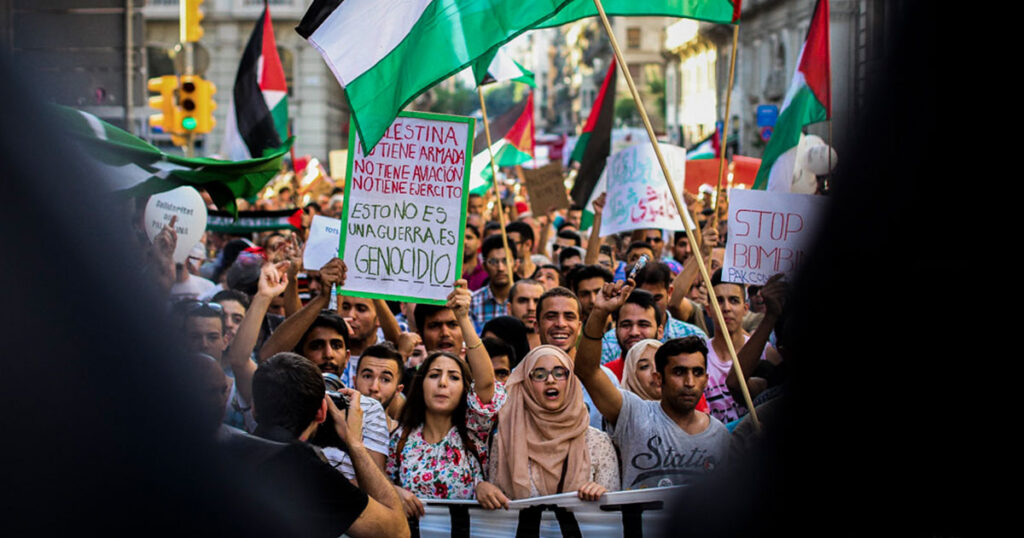
On a hot Sunday in August, my older brother and I joined my younger brother and about a dozen other concerned citizens to march in a weekly protest of Israeli action in Gaza. We marched from the corner of Buckley Park in Durango, Colorado, to the end of Main Street at the train station and then, crossing the street, marched the seven blocks back to Buckley Park. A few protesters who were unable to walk that far sat on the corner in lawn chairs and held signs.
Concerned is a strange adjective for this assortment of people and the feelings and motivations that inspired them. The youngest among us were in their early 20s, and the oldest in their 70s. Most of the protesters were veteran members of the group, a few were new members, and my brother and I, visiting in Durango, were tagalongs. I had gone more in support of my younger brother than to add my voice to the protesters’. Personal protest, group protest, righteous protest, indignant protest, astonished protest—whatever the protest, I expect dissension to be met not with interest or understanding but with a closed mind already on the defensive: Fortify positions for an attack. Do not give an inch for fear of being pushed a mile. I don’t believe you win people over. Those who welcome the display are already in your camp. Protesters would have to do a lot more than give an hour of their Sunday afternoon to bring any real change.
But we marched. We chanted. More people passing our motley group raised their hands in a sign of solidarity than heckled us. More people were on our side than against us. In an address to a Joint Session of Congress and the American People in 2001, President Bush said, “Every nation, in every region, now has a decision to make. Either you are with us, or you are with the terrorists.” But really, you’re with us, or you’re not, for any number of reasons, most probably mundane and some possibly extraordinary—reasons that might have nothing to do with choosing the other side. Hence the people on that Sunday who neither jeered nor smiled encouragement but looked at us blankly, the same way they might have viewed a scrap of paper fluttering by. Neither with us nor against. In the Alice Munro story “Oranges and Apples,” a man at a dinner party hoping to set a mood quotes some lines, another man asks distractedly what the first is saying, and a woman says matter-of-factly that it’s a poem. She answered “just as if someone had asked, ‘What’s that running across the road?’ and she had replied, ‘It’s a groundhog.’”
Many examples of effective protest might come to me if I put my mind to it, but even so, my sense is that protest is more about expressing disgruntlement or even outrage than about effecting change. When change comes, it looks to me like a monster rolling over in a dream rather than responding to the poking of angry people. Someone gets squashed as the monster gets comfortable. Why am I so convinced that chanting and rallying don’t work? Because protest never worked for me? Hey, that’s not right, that’s not fair, I have said, to no effect. I protest this! I won’t go along with it, I won’t be a part of it. Yet, it happened. We all went along. Now I can say I protested Israeli action in Gaza, as thousands and thousands have. Before we marched that Sunday, members of the group asked my brother and me about organized protest in Spain. “Yes,” my brother said. “There has been.” He told of attending a demonstration in Madrid—one of many—against Israeli atrocities. They still happened.
So instead of thinking someone might hear us and be swayed, or that someone might notice and be alerted—instead of thinking about people listening to us, I did the listening as I walked down the sunny street, chanting. “While you’re shopping,” we called out, “bombs are dropping.” Big breath. “While you’re eating,” another breath, “kids are bleeding.” We marched past a number of eateries with outdoor tables. Yes, while we’re eating, kids are bleeding. Others are starving. Some are writhing in pain, some are being abused, some are—well, one can’t bear thinking about it. My voice got trembly with emotion. The march down Main became a kind of self-castigation, my penance for my easy, happy week in Durango, my Hail Mary.
For days I kept thinking about the chants still circling in my head. Once I’d reframed them to While we’re living, others are dying, the words became bearable, because wasn’t I dying, too? Wasn’t my end marked? Twist everything around to While I’m dying, others are living, and the words were almost comforting: this will not so soon be over, but I won’t be here for it.

